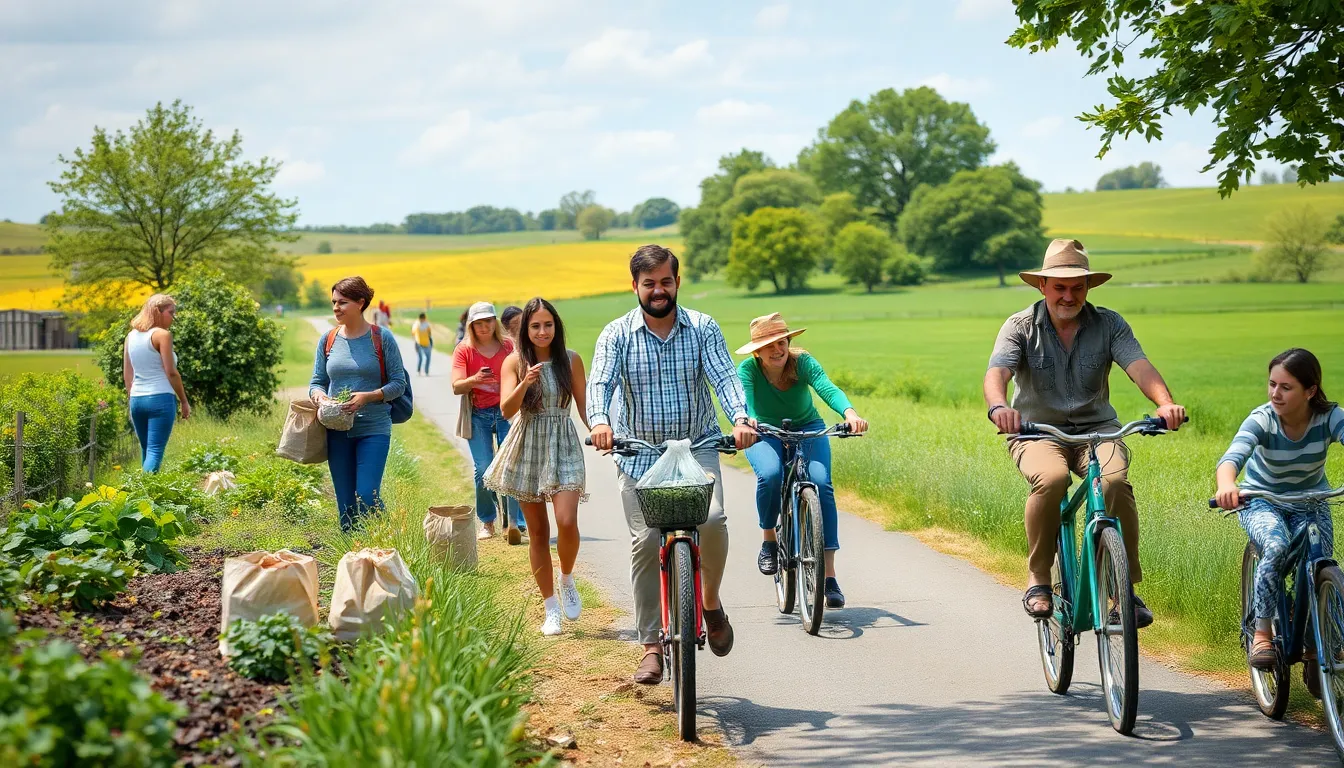Table of Contents
ToggleIn a world where plastic bags seem to multiply like rabbits and climate change feels like that annoying guest who overstays their welcome, sustainable living practices are more essential than ever. Imagine a life where your morning coffee doesn’t come with a side of guilt and your home is an eco-friendly fortress. It’s not just a pipe dream; it’s a lifestyle choice that’s easier than finding a parking spot at the mall during the holidays.
Understanding Sustainable Living Practices
Sustainable living practices focus on reducing one’s environmental impact. They encompass habits and choices that support ecological balance. Opting for reusable products over single-use items significantly cuts down on waste. For example, using cloth bags instead of plastic bags helps minimize plastic pollution.
Participating in local food systems enhances sustainability. Farmers’ markets provide fresh produce while reducing transportation-related emissions. Additionally, choosing organic food reduces pesticide use, improving soil health. People can also grow their own vegetables to further decrease reliance on store-bought goods.
Energy conservation plays a crucial role in sustainable living. Utilizing energy-efficient appliances reduces electricity consumption. Switching to LED lighting extends the life of bulbs while conserving energy. People can also consider renewable energy sources, such as solar panels, which provide clean energy for homes.
Water conservation stands as another essential aspect. Implementing low-flow fixtures in bathrooms and kitchens lowers water usage. Rainwater harvesting systems capture rain for irrigation, further promoting efficiency in water use. Additionally, xeriscaping with drought-resistant plants minimizes the need for irrigation.
Transportation impacts sustainability as well. Choosing public transport, biking, or walking reduces carbon footprints. Carpooling decreases the number of vehicles on the road, leading to lower emissions. Using electric or hybrid vehicles further supports a transition to cleaner modes of transport.
Collectively, these practices foster a lifestyle that respects the environment. They empower individuals to make choices that contribute to a healthier planet. Each step towards sustainable living creates a ripple effect, inspiring others to follow suit.
Benefits of Sustainable Living

Sustainable living practices offer numerous benefits that extend to the environment, economy, and personal health.
Environmental Impact
Adopting sustainable habits significantly reduces ecological footprints. Energy conservation lowers greenhouse gas emissions, which helps combat climate change. Reusable products decrease plastic waste, leading to cleaner oceans and reduced pollution. Supporting local food systems allows for fewer transportation emissions, fostering biodiversity. Participants in sustainable living effectively contribute to preserving natural resources and enhancing ecological balance.
Economic Advantages
Integrating sustainable practices often leads to cost savings. Utilizing energy-efficient appliances results in lower utility bills, benefiting household budgets. Additionally, investing in local produce strengthens local economies while minimizing transportation costs. By reducing waste, individuals save money previously spent on disposable items. Over time, these practices cultivate a more resilient economy, enhancing overall community sustainability.
Health Benefits
Sustainable living promotes a healthier lifestyle. Consuming locally sourced foods increases access to fresh, nutritious options that improve overall well-being. Regular physical activity, such as biking or walking, enhances fitness levels while reducing reliance on cars. Moreover, sustainable habits often lead to cleaner air and water, supporting long-term health. Engaging in eco-friendly choices fosters mental clarity and encourages a deeper connection to the environment.
Key Sustainable Living Practices
Sustainable living practices play a vital role in reducing environmental impact. Adopting these habits leads to a healthier planet and a more sustainable future.
Reducing Waste
Reducing waste focuses on minimizing items that end up in landfills. Embracing reusable products, such as cloth bags and water bottles, decreases reliance on single-use plastics. Composting food scraps enriches soil and minimizes organic waste. Participating in community recycling programs promotes proper waste management and encourages responsible disposal. Understanding packaging helps choose products with less environmental impact. Each small change leads to a significant reduction in waste over time.
Energy Efficiency
Energy efficiency involves using less energy to accomplish the same tasks. Switching to LED light bulbs reduces electricity consumption and lowers utility bills. Utilizing energy-efficient appliances lessens overall energy demand. Proper insulation in homes retains heat, resulting in less reliance on heating systems. Unplugging devices when not in use prevents phantom energy consumption. Adjusting thermostats can lead to substantial energy savings throughout the year.
Sustainable Transportation
Sustainable transportation prioritizes eco-friendly travel options. Using public transportation reduces the number of vehicles on the road, leading to lower emissions. Biking not only fosters physical health but also eliminates reliance on fossil fuels. Carpooling with others diminishes carbon footprints and promotes social connections. Electric vehicles provide a cleaner alternative to traditional gasoline-powered cars. Every choice affects air quality and climate change positively.
Conscious Consumption
Conscious consumption emphasizes mindful purchasing decisions. Supporting local farmers’ markets encourages sustainable agriculture and strengthens communities. Choosing items with minimal or recyclable packaging helps reduce waste. Researching product origins ensures ethical production practices are upheld. Buying second-hand items lowers demand for new products and extends the lifecycle of goods. Each conscious choice contributes to a more sustainable economy and environment.
Challenges of Implementing Sustainable Living
Adopting sustainable living faces several challenges that individuals and communities encounter. Each challenge influences the ability to effectively reduce environmental impact.
Financial Considerations
Cost often serves as a barrier to sustainable practices. Many eco-friendly products have higher upfront prices compared to conventional options. Organic food, energy-efficient appliances, and sustainable materials may present greater initial investments. Individuals may prioritize short-term savings over long-term benefits. Financial incentives, like tax credits or rebates, can encourage sustainable transitions, yet not everyone is aware of these opportunities. Seeking affordable solutions or local resources becomes integral for those interested in sustainable living.
Behavioral Changes
Behavioral shifts pose significant hurdles for sustainable living. Changing long-established habits requires effort, patience, and motivation. Individuals might resist altering their routines due to convenience or a lack of information. Education on the environmental impact of daily choices can influence behavior positively. Social influence also plays a role; peer pressure might encourage adopting sustainable practices or conversely deter action. Building community support helps facilitate sustainable changes through shared goals and accountability.
Embracing sustainable living practices is not just a trend; it’s a necessary shift towards a healthier planet. By making conscious choices in daily life, individuals can significantly reduce their environmental impact and inspire others to follow suit. Each small action contributes to a larger movement that promotes ecological balance and well-being.
The journey toward sustainability may come with challenges, yet the benefits far outweigh the obstacles. With community support and increased awareness, anyone can adopt habits that foster a more sustainable lifestyle. Ultimately, it’s about creating a future where both people and the planet can thrive together.







